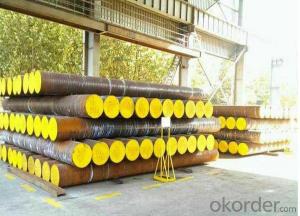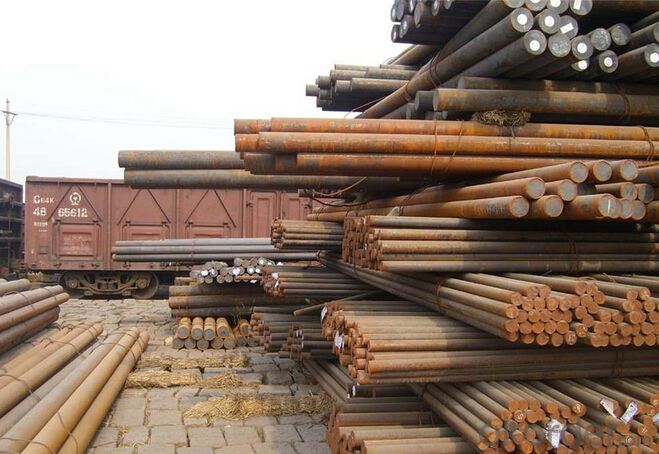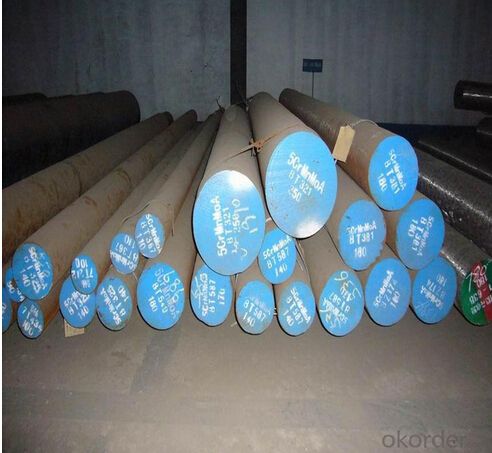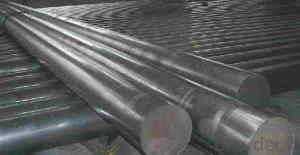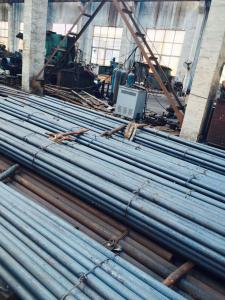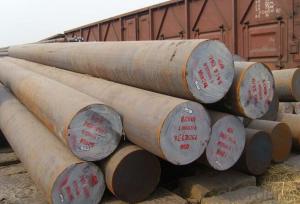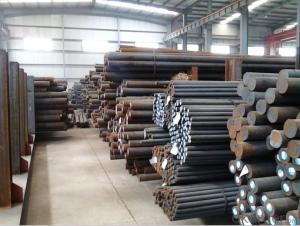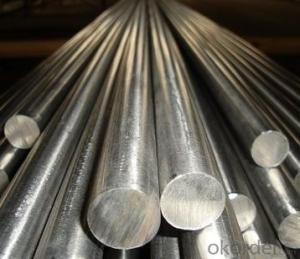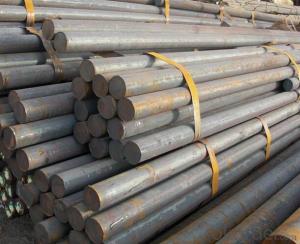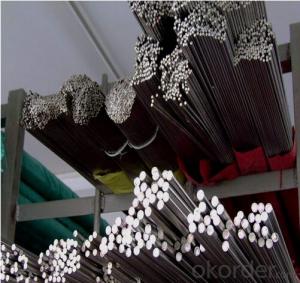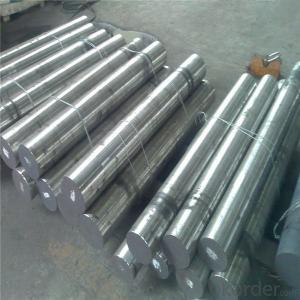Alloy Steel TC105 Special Steel Carbon Steel
- Loading Port:
- China main port
- Payment Terms:
- TT OR LC
- Min Order Qty:
- 25 m.t.
- Supply Capability:
- 10000 m.t./month
OKorder Service Pledge
OKorder Financial Service
You Might Also Like
Specification
Chemical Composition%
| Country | Standard | C | Si | Mn | Cr | S | P |
| China(GB) | T10A | 0.95-1.04 | ≤0.35 | ≤0.40 | - | ≤0.030 | ≤0.030 |
| USA(ASTM) | W110 | 0.95-1.10 | ≤0.35 | ≤0.35 | ≤0.20 | - | - |
| Germany(DIN) | 1.1645 | 1.00-1.10 | 0.10-0.30 | 0.10-0.35 | - | ≤0.030 | ≤0.030 |
| Japan(JIS) | SK105 | 1.00-1.10 | 0.15-0.35 | 0.15-0.50 | ≤0.30 | ≤0.030 | ≤0.030 |
Available Size
| Rolled flat steel | 20-100mm×205-600mm×L |
| Forged flat steel | 110-300mm×400-600mm×L |
Heat Treatment
| Item | Temperature ℃ | Hardness |
| Anneal | 750-760℃ | ≤210HB |
| Quenching | 770-790℃ | 62-64HRC |
| Tempering | 160-250℃ | 58-62HRC |
Characterstics
| 1.Low quenching temperature | ||||||
| 2.Higher hardness and abrasion resistance after heat treatment | ||||||
| 3.poor hardening ability and notable deformation |
Applications: Suitable for cold working dies and plastic moulds with simple shape


1, Your advantages?
professional products inquiry, products knowledge train (for agents), smooth goods delivery, excellent customer solution proposale
2, Test & Certificate?
SGS test is available, customer inspection before shipping is welcome, third party inspection is no problem
3, Payment Terms?
30% TT as deposit and 70% before delivery.
Irrevocable L/C at sight.
4, Trading Terms?
EXW, FOB, CIF, FFR, CNF
6, After-sale Service?
We provides the services and support you need for every step of our cooperation. We're the business partner you can trust.
For any problem, please kindly contact us at any your convenient time.
We'll reply you in our first priority within 24 hours.
- Q: Is special steel magnetic?
- Yes, special steel can be magnetic. The magnetism of steel depends on its composition and the presence of certain elements, such as iron, nickel, and cobalt. Special steels that contain these magnetic elements can exhibit magnetic properties. However, not all types of steel are magnetic. Some stainless steels, for example, have a higher content of non-magnetic elements like chromium, which reduces their magnetic properties. So, whether a specific type of special steel is magnetic or not will depend on its composition.
- Q: What are the requirements for special steel used in automotive parts manufacturing?
- The requirements for special steel used in automotive parts manufacturing are specific and crucial to ensure superior performance, safety, and durability of the vehicles. Here are some of the key requirements for special steel used in automotive parts manufacturing: 1. Strength and Hardness: Special steel used in automotive parts needs to have high strength and hardness to withstand the extreme stresses and loads that automotive components experience. This ensures the parts can endure heavy usage, resist deformation, and prevent failure under demanding conditions. 2. Ductility and Toughness: While being strong and hard, special steel must also possess good ductility and toughness. Ductility allows the steel to be formed and shaped into various intricate automotive parts, while toughness ensures that the parts can absorb energy and resist fracture or cracking upon impact. 3. Corrosion Resistance: Automotive parts are constantly exposed to various environmental conditions, including moisture, humidity, and road salts. Special steel used in automotive parts must exhibit excellent corrosion resistance to prevent rust and deterioration, thereby increasing the longevity and reliability of the parts. 4. Weldability: As automotive parts are often assembled through welding processes, it is essential for special steel to have good weldability. This allows for efficient and secure joining of different components, ensuring structural integrity and minimizing the risk of weld defects. 5. Heat Resistance: Special steel used in automotive parts manufacturing should have sufficient heat resistance to withstand high temperatures generated during engine operation, friction, or other thermal processes. This ensures that the steel maintains its mechanical properties even under extreme heat conditions, preventing premature failure or deformation. 6. Fatigue Strength: Automotive parts are subjected to repeated loading and unloading cycles, leading to fatigue failure if the steel does not have adequate fatigue strength. Special steel should possess high fatigue strength to withstand cyclic loading and resist fatigue cracks, enhancing the durability and reliability of the parts. 7. Dimensional Stability: Automotive parts need to maintain their shape and dimensions over time to ensure proper fit and functionality. Special steel used in manufacturing should exhibit dimensional stability, minimizing any warping or distortion during heat treatment or operational conditions. 8. Cost-effectiveness: While meeting the above requirements, special steel should also be cost-effective for automotive parts manufacturing. This means that the steel should be reasonably priced, readily available, and offer a good balance between cost and performance. Meeting these requirements is crucial for manufacturers to produce high-quality automotive parts that meet industry standards, perform optimally, and contribute to the overall safety and performance of vehicles.
- Q: Can special steel be used in the manufacturing of cutting-edge technology products?
- Yes, special steel can be used in the manufacturing of cutting-edge technology products. Special steel, such as high-strength alloys or stainless steel, offers various desirable properties like durability, corrosion resistance, and high strength-to-weight ratio. These characteristics make it suitable for the production of components used in advanced technology products like smartphones, laptops, aerospace equipment, and medical devices.
- Q: What are the specific requirements for special steel used in the chemical industry?
- In order to ensure optimal performance and safety, special steel used in the chemical industry must satisfy specific criteria. Some of the essential requirements for special steel in this industry comprise: 1. Corrosion resistance: The steel must exhibit high resistance to corrosion as it will be exposed to various aggressive chemicals and corrosive environments. This necessitates the steel's ability to endure the corrosive effects of acids, alkalis, and other chemicals commonly used in the industry. 2. High temperature resistance: The steel should demonstrate excellent heat resistance to endure high operating temperatures frequently encountered in chemical processes. This is crucial to prevent degradation or loss of strength when subjected to elevated temperatures. 3. Mechanical strength: Special steel used in the chemical industry should possess superior mechanical strength to withstand the high stress and pressure that may arise during chemical processes. It should maintain its structural integrity even under challenging conditions. 4. Fatigue and stress resistance: The steel must exhibit good resistance to fatigue and stress as it will be subjected to cyclic loading and pressure variations during operation. This is vital to ensure the longevity and reliability of the steel in the chemical industry. 5. Pitting and crevice corrosion resistance: Special steel should be resistant to pitting and crevice corrosion, which can occur in areas exposed to stagnant or low-velocity corrosive media. Pitting and crevice corrosion can lead to localized damage and failure of the steel, making resistance to these types of corrosion indispensable. 6. Low impurity content: Special steel used in the chemical industry should contain minimal impurities to minimize the risk of contaminating the processed chemicals. Impurities can react with the chemicals or cause undesired reactions, potentially resulting in product quality issues or safety hazards. 7. Easy cleanability: The steel should possess a smooth surface and be easily cleanable to prevent the accumulation of contaminants or fouling. This is crucial to maintain the purity of the processed chemicals and ensure efficient equipment operation. By meeting these specific requirements, special steel used in the chemical industry can endure harsh conditions and corrosive environments while preserving its structural integrity, performance, and safety.
- Q: How is leaded steel used in machining operations?
- Leaded steel is commonly used in machining operations due to its improved machinability. The addition of lead to the steel composition enhances its ability to be cut, drilled, and shaped with ease, reducing tool wear and improving surface finish. This type of steel is particularly useful in high-speed machining applications, where efficiency and precision are crucial.
- Q: How does special steel comply with international standards?
- Special steel is a type of steel that is specifically designed and manufactured to possess exceptional properties and performance characteristics. When it comes to complying with international standards, special steel undergoes a rigorous process to ensure its quality and adherence to the established norms. Firstly, special steel production adheres to international standards through the selection of raw materials. The composition and quality of the raw materials used in the manufacturing process are carefully controlled and tested to meet the specifications outlined by international standards organizations. This ensures that the special steel produced is of the desired quality and possesses the required mechanical properties. Secondly, special steel manufacturers follow standardized production processes. These processes are designed in accordance with international guidelines and standards to guarantee consistency and traceability. Through the use of advanced technologies and quality control measures, special steel manufacturers can monitor and control every stage of production, from melting and casting to rolling and heat treatment. This ensures that the final product meets the required standards in terms of chemical composition, mechanical properties, and dimensional tolerances. Furthermore, special steel undergoes stringent testing and inspection procedures to validate its compliance with international standards. This includes various destructive and non-destructive testing methods such as ultrasonic testing, hardness testing, and microstructure analysis. These tests are conducted by certified laboratories and independent third-party agencies to ensure unbiased and accurate results. In addition, special steel manufacturers often have their production processes and quality management systems audited and certified by recognized bodies, such as ISO (International Organization for Standardization), to demonstrate their commitment to compliance with international standards. It is also worth mentioning that special steel manufacturers actively participate in international standardization committees, such as ASTM International and the International Organization for Standardization (ISO). By engaging in these committees, they can contribute to the development and revision of international standards, ensuring that their products remain up to date and in line with the latest industry requirements. In conclusion, special steel complies with international standards through careful selection of raw materials, adherence to standardized production processes, rigorous testing and inspection procedures, and active participation in international standardization committees. By following these measures, special steel manufacturers demonstrate their commitment to producing high-quality products that meet the stringent requirements of international standards.
- Q: What are the specific requirements for special steel used in the chemical reactor industry?
- The specific requirements for special steel used in the chemical reactor industry can vary depending on the specific application and the type of chemicals being processed. However, there are some general requirements that are typically expected for this type of steel. Firstly, the steel used in chemical reactors must have excellent corrosion resistance. Chemical reactors often handle highly corrosive substances, such as acids, alkalis, and other reactive chemicals. Therefore, the steel must be resistant to the corrosive effects of these substances to ensure the integrity and durability of the reactor. Secondly, the steel should have high temperature resistance. Chemical reactions often require high temperatures to facilitate the desired chemical transformations. The steel used in these reactors must be able to withstand these elevated temperatures without losing its structural integrity or undergoing any significant deformation. Furthermore, the steel should have good mechanical properties, including high strength and toughness. The reactor may experience high pressure and mechanical stress during operation, so the steel must be able to withstand these conditions without failure. Additionally, the steel used in chemical reactors should have good weldability and formability. This allows for ease of fabrication and construction of the reactor, ensuring a reliable and efficient manufacturing process. Moreover, the steel should have low levels of impurities, such as sulfur and phosphorus. These impurities can adversely affect the performance of the steel in terms of corrosion resistance and mechanical properties. Therefore, the steel must meet strict quality standards to ensure it is suitable for use in the chemical reactor industry. In summary, the specific requirements for special steel used in the chemical reactor industry include excellent corrosion resistance, high temperature resistance, good mechanical properties, weldability, formability, and low levels of impurities. Meeting these requirements is crucial to ensure the safety, reliability, and efficiency of chemical reactors in various industrial processes.
- Q: How does special steel contribute to improving product efficiency in energy-intensive processes?
- Special steel contributes to improving product efficiency in energy-intensive processes by providing enhanced strength, durability, and resistance to corrosion and wear. These properties allow for the development of more efficient machinery and equipment, reducing energy losses due to friction and wear. Additionally, special steel's high heat resistance enables the production of components that can withstand extreme temperatures, improving overall energy efficiency in processes such as high-temperature heat treatment or combustion. Moreover, its superior mechanical properties enable the construction of lighter and more compact designs, leading to reduced energy consumption during transportation and operation. Overall, special steel plays a vital role in optimizing energy-intensive processes by enhancing performance, longevity, and energy efficiency of products and equipment.
- Q: How does nitriding steel improve hardness and wear resistance?
- Nitriding steel improves hardness and wear resistance by introducing nitrogen into the surface of the steel, forming a hard nitride layer. This layer increases the surface hardness of the steel, making it more resistant to wear, friction, and scratching. Additionally, the nitride layer also provides improved resistance against corrosion and high-temperature oxidation.
- Q: What are the main advantages of using special steel in the construction of bridges?
- The main advantages of using special steel in the construction of bridges are its high strength-to-weight ratio, excellent corrosion resistance, and durability. Special steel possesses superior mechanical properties, allowing for the construction of lighter and more efficient bridge structures. It also offers enhanced resistance to environmental factors like moisture, temperature variations, and chemical exposure, leading to longer service life and reduced maintenance costs. Additionally, special steel facilitates the use of innovative and complex bridge designs, enabling architects and engineers to create unique and aesthetically pleasing structures.
Send your message to us
Alloy Steel TC105 Special Steel Carbon Steel
- Loading Port:
- China main port
- Payment Terms:
- TT OR LC
- Min Order Qty:
- 25 m.t.
- Supply Capability:
- 10000 m.t./month
OKorder Service Pledge
OKorder Financial Service
Similar products
Hot products
Hot Searches
Related keywords
